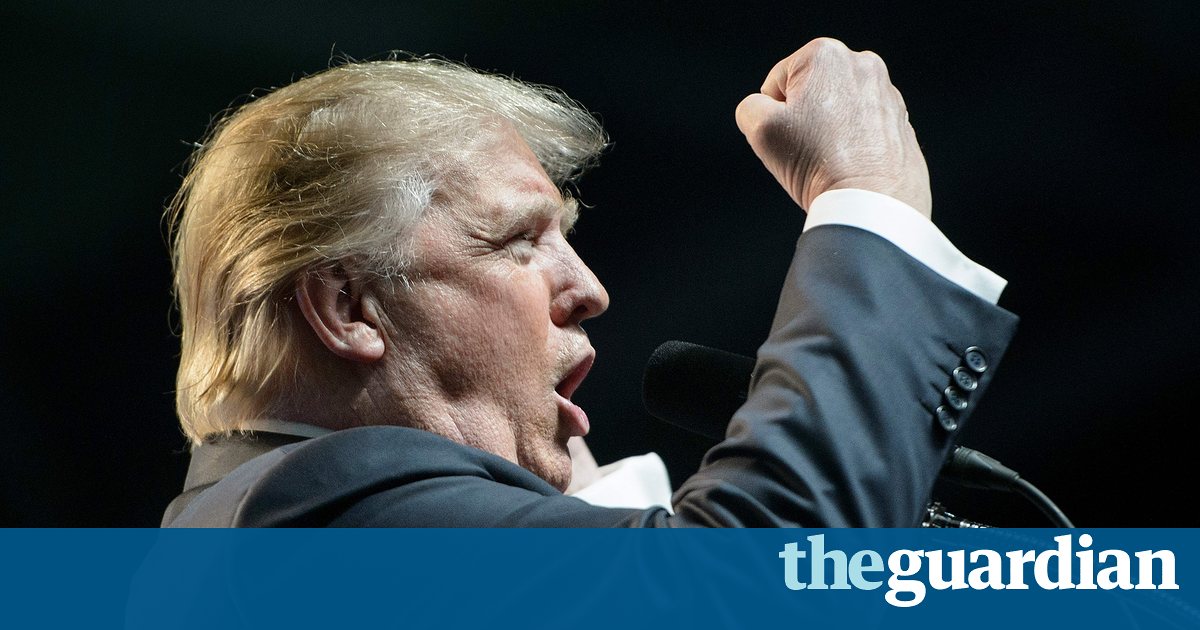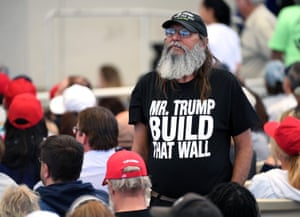My journeys in Trumpland

Two years on the campaign trail revealed an America forgotten in the bicoastal media bubble, leaving our writer unsurprised when Hillary Clinton was beaten

Sixty million Americans voted for Donald Trump, each for their own reasons. Some were simply angry or afraid. Others were bored, indifferent to all the outrage directed at their candidate, eager for change above all else. Many, undoubtedly, welcomed permission to vent dark feelings of resentment towards people not like them. All were alien to a coastal cognoscenti which decided long ago that this election was a foregone conclusion.
Under the commonly agreed rules by which presidential races are decided, it wasnt even close. Democrats clung to a consolation prize that although they lost almost all the key electoral battleground states on Tuesday, Hillary Clinton received 600,000 more votes overall because her supporters were concentrated in more populous cities. A less reassuring way of thinking about this is that Trumps supporters were more evenly distributed in the places that most closely reflected the nations diverse political reality while Clintons were huddled together in like-minded bubbles.
The new American swing states became more familiar to me over the course of two years, at least 100 rallies and tens of thousands of miles on the campaign trail. The primary and general elections took me to 24 states, including a year embedded with Bernie Sanders campaign, and then, once he lost, non-stop travel with Clinton and Trump. It meant I lived and worked for much of this time in 10 states that determined the eventual result: Iowa, Ohio, Florida, Wisconsin, North Carolina, New Hampshire, Colorado, Michigan, Virginia and Pennsylvania.
Airports in Des Moines, Cleveland, Miami, Milwaukee, Charlotte, Manchester, Denver and Detroit, the roads to Richmond or Pittsburgh: all became almost as familiar as Reagan National Airport and the Beltway were back home. In Washington and New York, I rarely met anyone who thought Clinton could possibly lose. Out on the trail, I rarely met anyone beyond the campaigns often sparsely attended official events who was enthusiastic about her.
I gave up looking for explanation among DCs identikit army of pundits and academics. At first it was embarrassing to be constantly told I was naive to question the Clinton coronation; eventually it was just annoying that they seemed incapable of understanding what voters saw in Sanders or Trump when I had just come back from rallies packed to the rafters with adoring fans.
Talking to reporters on other newspapers was sometimes difficult too, if you wanted to conform to the required savvy nonchalance of the modern profession. On the Clinton plane, where we helped take turns as pool reporters, it was heresy to contemplate her loss out loud. Even at the back of the Bernie bus, there was open contempt for his quixotic tilt at the Democratic nomination.
Incredulous editors and columnists were more easily persuaded something was up when the primary results for both parties started coming in: 22 wins in total for a 74-year-old Jewish democratic socialist from Vermont, a near clean sweep for a reality TV host who hadnt met a demographic he couldnt insult.
In the end, there was no new surge of Hispanic or women voters coming out for Clinton in disgust of Trump, just a shortfall of several million white (and black) working class voters who had turned out for Obama but chose to stay at home this time; lots of Republicans who proved far less appalled by their candidate than they were willing to tell the pollsters.
This supposedly hidden minority proved impervious to sophisticated sampling techniques and poll modeling. Yet finding Trump supporters outside the Beltway was never difficult. One reporting trick was to go to the car park of a home improvement chainstore on a midweek morning: a guaranteed place to find underemployed white men with time on their hands to talk and nothing to lose.
The loudmouth minority
In a Lowes at Steubenville, a depressed former steel town near the border between Ohio and Pennsylvania, one retired carpenter summed up the cavalier mood as he stacked lumber into the back of his pick-up truck, for a deck his wife had requested.
A photo posted by Dan Roberts (@danroberts73) on
I think Trump is nuts, but Id love to have him as a president to see what happens, said 68-year-old Edward Tucker earlier this year. I wouldnt want to end up in some kind of war or anything, he added hastily, pointing out he had no regrets about twice voting for Barack Obama. But something is going to change if [Trump] is president. We just dont know what.
For men of a certain age, who had watched the certainties of small town prosperity vanish in a generation, it was hard to conceive that things could get any worse, short of nuclear armageddon. Even then, little that Trump had to say would shock them. But plenty of women felt the same way too.
Christy Cranston, a young professional I met with her husband outside a Trump rally in Charlotte, was mainly frustrated that the Republican candidate chose not to defend his aggressive, loud-mouthed outbursts more aggressively.
I would like him to say, Yes, Im a smartass and Yes, I say whats on my mind but I hope what comes out of my mouth doesnt take away what Im really fighting for, she said. I have never heard him say anything that was directly racist or against women. They were like comebacks for someone attacking him first.
Whether Trump intended to be as racist and sexist as he sounded is a separate question that deserves more scrutiny, but many are now reassessing the recent remarks on the subject of another controversial supporter, Facebook investor Peter Thiel.
I think one thing that should be distinguished here is that the media is always taking Trump literally, Thiel told the National Press Club shortly before the election. It never takes him seriously, but it always takes him literally.
I think a lot of voters who vote for Trump take Trump seriously but not literally, so when they hear things like the Muslim comment or the wall comment, their question is not, Are you going to build a wall like the Great Wall of China? or, you know, How exactly are you going to enforce these tests? What they hear is were going to have a saner, more sensible immigration policy.
There is little doubt that Trump can be both crudely inarticulate and a consummate communicator at the same time. During his awkward first meeting with Obama on Thursday, he provided a textbook display for watching journalists.
If you followed the remarks as they are written in the official transcript, the president elect was talking gibberish. We discussed a lot of different situations, some wonderful and some difficulties, he said of his meeting with Obama. I very much look forward to dealing with the president in the future, including counsel. He explained some of the difficulties, some of the high-flying assets and some of the really great things that have been achieved.
If you watch and listen to the event, Trump seems much more in control. Like George W Bush before him, his syntax is all over the place, but the meaning is clear. In contrast to the cerebral Obama or the mannered Hillary Clinton, middle America can perhaps see a reflection of itself loud and inarticulate perhaps, but not stupid.
It would also be naive to pretend there is not a deeply cynical intent behind the gaffes too. Where other politicians might be accused of dog-whistle politics, Trump was broadcasting at a frequency accessible to all, exploiting the nations three biggest weaknesses: rust, race and ignorance.
Rust
Putting aside a handful of fickle Floridians, Trump won on Tuesday almost entirely because he changed the political landscape of the industrial midwest, aka the Rust Belt.
The 70 electoral votes accumulated in Wisconsin, Ohio, Michigan, Iowa and Pennsylvania were a bigger electoral prize than Texas and New York combined. Throw in New Hampshire and Minnesota where only 50,000 similar voters kept Clinton from even worse defeat and most of these states were ones she also lost in the Democratic primary election.
Not all of these places are struggling with globalisation, by any means. Minneapolis has a thriving medical industry. Cleveland showed the world what urban renewal can look like during the Republican convention. Every time I went to Des Moines I was told it had come on a long way.
There is strong local pride too, often manifested in regional junk food that delights in its rejection of the Whole Foods aesthetic: chili in Cincinnati, cheese curds in Wisconsin, loose meat burgers in Iowa and, everywhere, BBQ.
But the combination of closed factories, stagnant disposable incomes and a wealthy countrys remarkable resistance to infrastructure investment leaves an indelible feeling of decay too. Even downtown Philadelphia, a vibrant Democratic stronghold, boasts an impressive display of rust. Empty downtown streets in mid-size cities in eastern Iowa or the Mahoning Valley of Ohio provided an awkward backdrop to a Clinton machine determined to accentuate the positive but fertile territory for Trumps unshackled warnings on trade and the rigged economy.

The mood was by no means confined to the midwest, or to Trump supporters. Goldsboro, North Carolina, has, according to a recent Pew Research study, seen the sharpest national decline in the share of its citizens who earn enough to qualify as middle class: a phrase that implies the glass is half-full in class-conscious Britain, but became shorthand for everyone who is hard-working yet struggling during the 2016 US election.
It was here that I met Latonia Best, who has three bachelors degrees, is raising three children on her own and has been working for three years as a special needs teacher. Unfortunately that was not the only trio in her life: she also had to hold down three jobs to make ends meet, leaving full-time employment in school to do home visits four evenings a week for two peripatetic teaching contracts, as well as weekend babysitting
My children dont understand, she said. They only live in the now. I have to tell my son that I dont really have the money to do such and such. But Mama why, that doesnt make sense, you work every day? he says.
For teachers like Best, for whom a basic take-home salary of $3,333 left just $50 spare each month, politicians did not talk enough this year about Americas struggling middle class.
Listening to both the main candidates right now, in the early stages of the campaign at least, there is a lack of talk about what makes the middle class what it is how they will improve our lives, Bests colleague Lashaundon Perkins told me. The United States? Were in bad shape.
In case this seems hyperbolic, that Pew study found that 203 of the 229 metropolitan areas in the US saw a fall in the share of adults living in middle-income households between 2000 and 2014.
It defines middle as earning somewhere between two-thirds and twice the national median income, which means some of those who left the bracket became richer, some poorer. But soaring inequality came with signs of shrinking social mobility too, as a college education became ever more unaffordable for many families and employment prospects spiralled downward for those who chose to stay in Rust Belt America.
Somehow, a billionaire property developer living in a gold tower in Manhattan convinced them that he could be their champion. To do so, he needed to push other buttons too.
Race
No American election would be complete without Florida. It was here that explaining away Trumps appeal with reference to simple economic hardships was hardest.
There are plenty of clouds in the sunshine state, of course: plenty of low-wage jobs with poor employment protection, plenty of homeowners still struggling to dig themselves out from under a particularly dramatic version of the national housing crash.
But here too were gleaming symbols of the American dream, marinas full of yachts in Fort Lauderdale, just down the road from rallies where Clinton was trying to rouse the states more diverse population. Trump signs scattered all over immaculate lawns in prosperous cities like Tampa. In The Villages, the worlds largest retirement community, whose population of more than 100,000 is growing faster than any town in the US, Trumps many supporters reportedly declared their enthusiasm by riding around on golf carts decked out in his logo.
Both candidates spent more time here than anywhere else. Clinton spent five days in the state in the last week alone, before returning north, seemingly satisfied that a sleeping giant of Latino voters was emerging from the early voting data to deprive Trump of a must-win state.
It was true that unlike many other diverse states such as California, Florida did buck the national trend and see a small rise in turnout, but the new voters were nowhere near enough to compensate for the wave of white support that Trump received. In the end, it was nowhere near time to count hanging chads again, with Trump ahead in the state by 130,000. There were more latino voters for Trump than Mitt Romney, perhaps a sign that those who have successfully navigated through enough byzantine immigration rules to reach the electoral roll may actually be less sympathetic to the plight of their undocumented brethren.

Across the country, Trump won the white vote by a record margin for any president. To dismiss all these voters as racist would itself be as bigoted as it is simplistic, but it is hard to deny that few of them can have been unaware of his attitudes toward muslims and Mexicans, his support from the Ku Klux Klan or the dismissive tone he adopted toward the Black Lives Matter movement.
The strand of white nationalism inherent in the Trump campaign became more explicit with the arrival of Steve Bannon as his new campaign chief executive, a man whose alt-right website Breitbart.com makes no bones about its belief that America is beset with political correctness.
At a party hosted in Breitbarts Washington headquarters to launch a new book on Trump by fellow-traveller Ann Coulter, I met a group of supporters eager to discuss their theories on race with someone whose English accent must have marked me out as sympathetic.
Everyone says were a nation of immigrants but were not, said one man, proudly sporting a Trump T-shirt. Were a nation of northern European immigrants. We shouldnt have to pay more just to live among our own demographic.
Absolutely, agreed the woman next him. My family go back to the 1680s.
Coulters new book, In Trump We Trust: E Pluribus Awesome!, echoed the racially triumphant mood. The same way virtually any immigrant to Finland makes it less white, almost any immigrant to America makes it less honest, she wrote. Theres nothing Trump can do that wont be forgiven. Except change his immigration policies.
Even in the supposedly cosmopolitan US capital, there is sometimes shockingly little tolerance. A block from the White House, I stood behind a man in McDonalds who was berating the Spanish-speaking, minimum wage staff at midnight. He was angry at them not having the linguistic skills to describe to him the exact contents of a salad he was trying to order. Speak American, is a phrase, baffling to Brits, often seen and heard in Trumpland.
Many Americans regard their countrys overt displays of nationalism as relatively benign. Ohio in particular is bedecked with the stars and stripes. Four years of a Trump administration may change the nations view of its flag and those chants of USA, USA which became a sound track to his rallies. Or perhaps not.
Ignorance
On my last flight out of Reagan, a week before the election, I had breakfast next to a couple who were flying back to Atlanta after he had come to Washington to run in the Marine Corps marathon. Looking up at the constantly scrolling CNN chyrons on the television above us, she remarked: Id forgotten it was the election soon. Is it next week, or next month?
It was only then that I realised just how much of a bubble I had lived in too for the last two years, convinced that the most important thing in the country was its election, living on campaign jets where the hours, minutes and seconds where counted down on electronic clocks.

Much has already been written about the impact of modern media consumption habits in contributing to a post-truth election where Trumps repeated untruths went unchallenged on social media and in fawning television interviews.
Yet both halves of America live in splendid isolation. After the election, liberal friends drew solace in a shared Facebook story claiming that Barack Obama had somehow saved them from the worst of a Trump administration by permanently protecting the right to an abortion sadly glossing over the all-important role of the supreme court in such matters.
Ironically, one of the most widely shared quotes attributed to Trumps mendacity turns out to be probably fake too. He was alleged to have told People magazine in 1998: If I were to run, Id run as a Republican. They are the dumbest group of voters in the country. They believe anything on Fox News. I could lie and theyd still eat it up. I bet my numbers would be terrific.
Unfortunately, Fox was barely up and running at that point.
Few of these misleading liberal memes come close however to the avalanche of inaccurate claims made by Trump over the course of the election: from trivial boasts about the size of his crowds through to whoppers like claiming Mexico will pay to build his wall.
Whether the shift back toward a more questioning media environment that he has already encouraged will continue remains to be seen, but it would be wrong to assume that voters would believe it if they saw it. My journeys through Trumpland suggest a country already living in parallel universes: anxious, bored and ready to believe what they want to hear.
Read more: https://www.theguardian.com/us-news/2016/nov/13/donald-trump-president-rust-belt-white-house